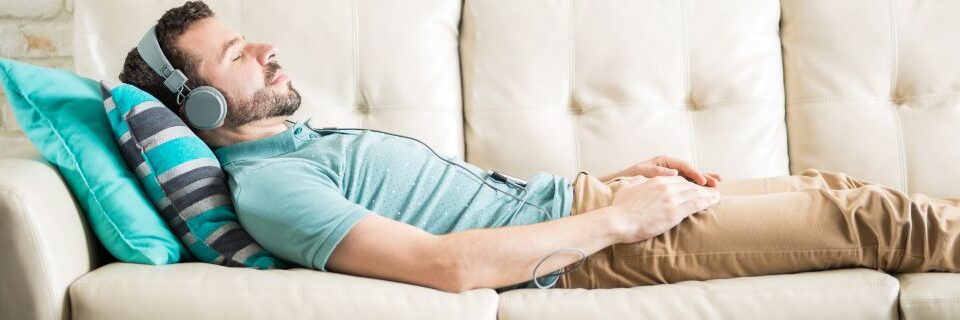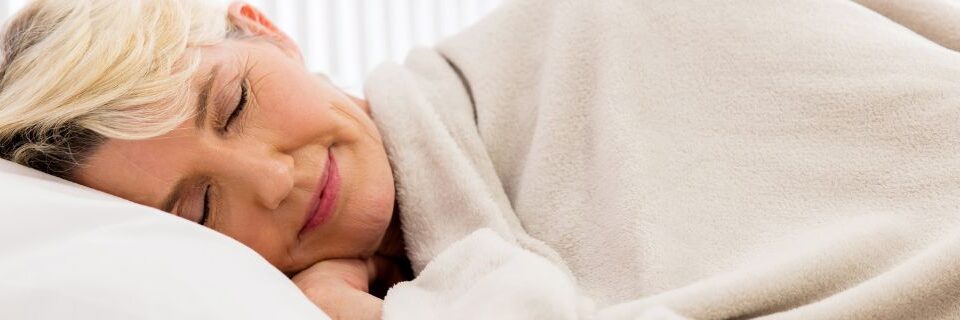
Online Hypnosis: Separating Fact from Fiction

15 Tips to Sleep Better at Night
Table of Contents
Obstructive sleep apnea, or OSA, is a potentially serious sleep disorder that is associated with pauses in breathing, called apnea episodes, during sleep. People with OSA often snore loudly and may have pauses in their snoring or breathing periodically. They may awaken feeling tired or unrefreshed, and they may fall asleep at inappropriate times during the day. OSA is also associated with sore throats, dry mouth symptoms, morning headaches, and irritability. If you have symptoms of apnea, you might be curious: Can sleep apnea be cured at home? The answer to the question, “Can sleep apnea be cured naturally” varies, but in many cases, with lifestyle changes, you can experience significant symptom improvement.
What is the Best Sleep Aid for Sleep Apnea?
Without treatment, OSA can lead to potentially serious complications, including daytime fatigue, high blood pressure, and metabolic syndrome. Treatment is essential and can restore your quality of life and wellbeing.
Unlike other sleep disorders, OSA is not typically treated with drugs. Sleep medications can worsen apnea symptoms. People with OSA may be advised to use a special machine called a CPAP machine, which uses air to keep your airways open while you sleep. CPAP machines are highly effective, but they are not necessarily comfortable for all apnea sufferers, which means they might not use them consistently or at all.
Some OSA sufferers prefer oral appliances instead. Oral appliances work by gently shifting the position of the jaw, which helps keep the airway open or prevents the tongue from falling over the airway. These appliances can be effective for people with mild to moderate apnea who cannot tolerate CPAP therapy but might not be right for all people with OSA.
Does elevating your head help sleep apnea? Research shows that elevating the head of the bed can reduce apnea symptoms and improve sleep efficiency, making it a good choice for some people.
Hypnosis for better sleep is another good choice that can help you develop sleep-friendly habits during the daytime. Specifically, hypnosis for sleep disorders can help you manage specific issues that could be contributing to nighttime symptoms, such as excessive weight or alcohol intake. While hypnosis alone cannot cure OSA, our sleep hypnosis app can lead to a better sleep by helping you manage issues that could be contributing to symptoms, such as alcohol intake, excessive weight, and sleeping position. With hypnosis for sleeping disorders, you have access to one of the best sleep aids possible, empowering you to take steps to improve your overall health and wellness.
Can Sleep Aids Help OSA?
When you sleep, your body relaxes, including your breathing muscles and the muscles that support your airways. In most people, the airways are still supported enough to allow air to pass freely. In people with OSA, the airways can become dangerously narrowed, which can result in restricted breathing during sleep.
OSA can affect anyone but is most common in older adults and men. Because it can lead to daytime fatigue, drowsiness, and feelings of poor sleep quality, many of them find themselves reaching for sleep aids in an attempt to get better quality sleep. This can be dangerous.
Conventional sleep aids, such as medications, are not effective with OSA and can worsen its symptoms. Antihistamines, sleeping pills, and herbal supplements that relax the body further and deepen sleep can make it harder to wake up and interfere with the body’s ability to breathe even more, which can create potentially dangerous situations for the OSA sufferer.
Hypnosis for sleeping disorders can be one of the best sleep aids to use with OSA because it does not mask the problem but rather gives you tools to manage underlying factors so that you can get better sleep.
How Do You Self Treat Sleep Apnea?
Lifestyle changes can be highly effective in treating OSA. For sufferers who are overweight, losing some weight and improving muscle tone can help eliminate some of that extra tissue in the throat, improving airway function. Adjusting daytime habits for better sleep hygiene can also be beneficial. This means limiting caffeine, alcohol, and nicotine intake and addressing any issues with substance use while increasing exercise, especially during daylight hours. Because apnea episodes are typically most common in those who sleep on their backs, positional therapy can also be effective, encouraging people to sleep on their sides or stomachs, along with raising the head of the bed.
In one study, a patient with chronic snoring, which is associated with OSA, was able to overcome her snoring by using hypnosis for sleep. She used hypnosis techniques to learn to roll over, relax, and breathe in through her nose and out of her mouth anytime she felt uncomfortable, stressed, or anxious. With our self-hypnosis app, you can also learn to relax, change your position, and calm your mind. You can use hypnosis techniques to adjust the way you think about sleep and change certain habits and behaviors both while you are awake and asleep, addressing subconscious patterns that could be contributing to your OSA episodes.
With a download hypnotherapy app, you can transform how you sleep and how much you sleep.
If you struggle with OSA or snoring, hypnosis may help you get a better night’s sleep. You can overcome unhealthy habits, develop improved sleep hygiene, and develop new skills to tackle stress and anxiety. Visit UpNow.com today to learn more or to download our sleep hypnosis audio.
UpNow Health only uses high-quality sources, including peer-reviewed articles, to support the facts within our articles. All our articles are reviewed by experts to ensure that our content is accurate, helpful, and trustworthy.
1. Booth, Stephanie. “Can Medicine Help with Sleep Apnea?” WebMD, www.webmd.com/sleep-disorders/sleep-apnea/sleep-apnea-can-medications-help.
2. Brooks, Rita. “5 Alternative Sleep Apnea Treatment Options.” Aastweb.org, 2018, www.aastweb.org/blog/5-alternative-sleep-apnea-treatment-options.
3. Hauri, Peter J., et al. “The Treatment of Parasomnias with Hypnosis: A 5-Year Follow-up Study.” Journal of Clinical Sleep Medicine, vol. 03, no. 04, 15 June 2007, pp. 369–373, 10.5664/jcsm.26858. https://jcsm.aasm.org/doi/10.5664/jcsm.26858
4. Kraft, David. (2015). Successful treatment of snoring using hypnosis. Contemporary Hypnosis and Integrative Therapy. 30. 179-188. https://www.researchgate.net/publication/282816964_Successful_treatment_of_snoring_using_hypnosis
5. Mayo Clinic. “Sleep Apnea – Symptoms and Causes.” Mayo Clinic, 2018, www.mayoclinic.org/diseases-conditions/sleep-apnea/symptoms-causes/syc-20377631.
6. “Obstructive Sleep Apnea.” Www.hopkinsmedicine.org, www.hopkinsmedicine.org/health/conditions-and-diseases/obstructive-sleep-apnea.
7. “Obstructive Sleep Apnea (OSA) Medication: CNS Stimulants, Dopamine/Norepinephrine Reuptake Inhibitors.” Emedicine.medscape.com, emedicine.medscape.com/article/295807-medication.
8. Souza, Fábio José Fabrício de Barros, et al. “The Influence of Head-of-Bed Elevation in Patients with Obstructive Sleep Apnea.” Sleep & Breathing = Schlaf & Atmung, vol. 21, no. 4, 2017, pp. 815–820, www.ncbi.nlm.nih.gov/pmc/articles/PMC5700252/, 10.1007/s11325-017-1524-3.
9. “Your Guide to Over-The-Counter Sleep Aids.” Mayo Clinic, 2019, www.mayoclinic.org/healthy-lifestyle/adult-health/in-depth/sleep-aids/art-20047860.











